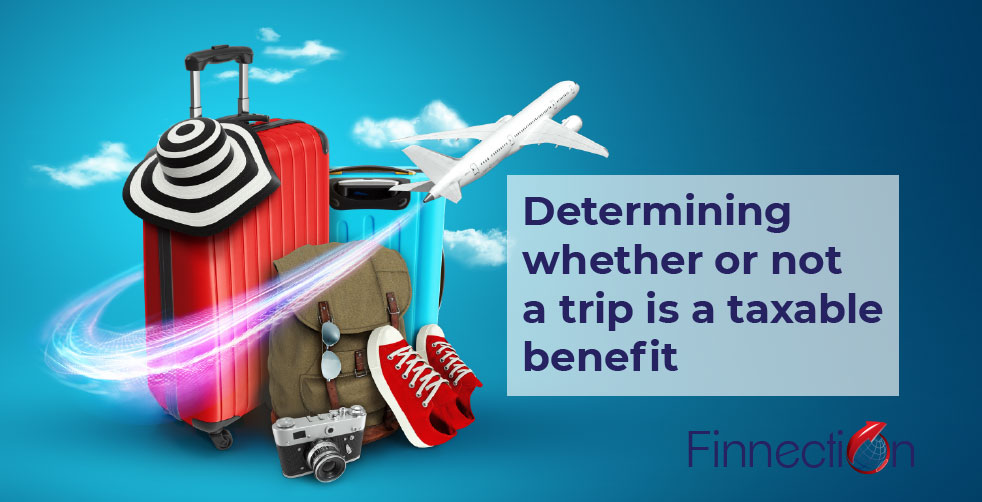Determining whether or not a trip is a taxable benefit
Might be you are required to visit any sunny location like Mexico or Dominican Republic. The purpose of this visit is to attend the conference trip as an advisor. The trip value is taxable subjected to your role on the trip, the role might be:
- as an employee of the trip sponsor
- an advisor selected for the trip
- an employee of a supplier
This difference was crucial in a recent tax case in the Court of Quebec comprising a BMO Insurance (BMO) employee who was evaluated for a taxable employment benefit of $1,872 by Revenue Québec (RQ) for a business trip he took back in 2015.

There are certain duties performed by the Taxpayer’s, few of them are as follows:
- Build relationships with managing general agents (MGAs)
- working collaboratively with dealers and advisors
- Give training on BMO products
- Empowering to sell BMO products to their customers.
To Sponsor an “Elite Congress” in Cancun, MGA approached BMO in August 2015. Through this conference the top performing brokers and advisors of MGA’s were gathered at the same place. The benefit given to the brokers and advisors by the sponsor is one person’s airfare with a free stay in hotel for one week. Through this sponsorship the sponsor was permitted to deliver a demonstration for their products.
Each MGA business volume (or potential volume) is subjected to BMO’s participation in these types of conferences. Every year BMO participates in about five conferences, and every two to three years each MGA hosts one convention.
Since this, to gain the visibility of brokers BMO found this a very striking opportunity and accepted to sponsor the conference because this specific MGA was a major business partner of BMOs for many years. It agreed to send a taxpayer — a BMO employee — to Cancun to represent BMO, the only conference attendant by the taxpayer in 2015.
The conference featured a wide range of activities, some specifically connected to work, including a company booth and training sessions and other relates to entertainment activities. The taxpayer gave a detailed presentation to the clients about BMO’s products at the conference. Furthermore, during the conference he took part in as possible as many client-related activities. Meanwhile, he continued with his normal job duties, such as replying to e-mails and getting back phone calls.
When the taxpayer returned to Canada, he sent a “very detailed email” explaining all of the meetings he had with advisors or brokers, as well as the protentional outcomes that may be derived from the meetings. He got acknowledge from his Boss for the advancement work he had done in Cancun.
The MGA was the main topic of a taxable advantage audit pertaining to the Cancun conference the respective year. Attendees were divided into three groups by the RQ: MGA employees, brokers and advisors who qualified in a sales contest, and insurance company representatives, including the taxpayer.
The MGA staff members were sent on the trip as part of their regular job duties, the tour shall not constitute a taxable employment benefit for them, RQ ascertained. On the other hand, RQ ascertained that the winning advisors’ trip constituted “entertainment,” and assessed a taxable benefit equal to 100% of the trip worth.
Moreover, RQ claimed that the employees attending the conferences as a representative of the sponsors, only 37.5 percent of the trip was for business reasons, and the rest was a taxable benefit. As a result, RQ revaluated the taxpayer in May 2018 for a taxable benefit equal to 62.5 percent of the trip’s value, or $1,872.
This assessment was not accepted by the taxpayer and he challenged the assessment in court that his attendance at the Cancun conference should have been entirely considered as a business trip and not as a taxable benefit in any way.
The judge evaluated the details of the case and mentioned that preceding case law identifies that, although certain activities on such types of business trips could be “entertaining in nature,” this does not preclude the trip’s main objective from being business development.
As a consequence, the court decided that no segment of the trip’s cost should have been taxable benefit to the BMO employee because his attendance in the trip was neither an award nor a prize.
For more details about tax on trips in Canada, contact finnection via email at info@finnection.ca or call us at (647) 795-5462
Disclaimer: Above information is subject to change and represent the views of the author. It is shared for educational purposes only. Readers are advised to use their own judgement and seek specific professional advice before making any decision. Finnection Inc. is not liable for any actions taken by reader based on the information shared in this article. You may consult with us before using this information for any purpose.
